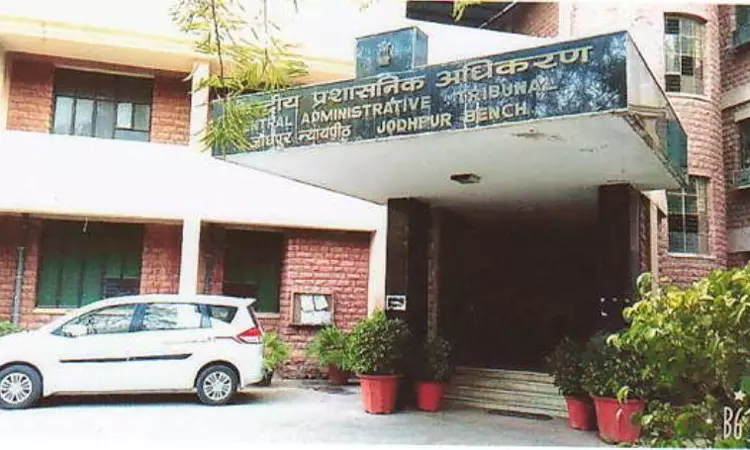- Home
- /
- Labour & Service
- /
- Tribunal Has Right To Quash And Set...
Tribunal Has Right To Quash And Set Aside Disciplinary Authority's Orders If They Contravene Settled Principles Of Law Or Principles Of Natural Justice: Jodhpur Central Administrative Tribunal
Rajesh Kumar
7 May 2024 4:00 PM GMT
The Central Administrative Tribunal Jodhpur bench of Justice Rameshwar Vyas and Dr. Amit Sahai held that it may not serve as an appellate authority over decisions made by other appellate bodies but it possesses the authority to annul and invalidate disciplinary orders issued by the disciplinary authority if they contravene well-settled principles of law and violate the principles...
The Central Administrative Tribunal Jodhpur bench of Justice Rameshwar Vyas and Dr. Amit Sahai held that it may not serve as an appellate authority over decisions made by other appellate bodies but it possesses the authority to annul and invalidate disciplinary orders issued by the disciplinary authority if they contravene well-settled principles of law and violate the principles of natural justice.
Brief Facts:
The matter pertained to allegations of misconduct leveled against the Applicant who was Gramin Dak Sevak (Mail Carrier) at Rajasthan Krishi Vishwavidyalaya Sub Post Office in Bikaner. The Charge Memorandum accused him of assisting the Sub Postmaster in embezzling funds from the post office. It was alleged that the Applicant held onto depositors' passbooks and failed to return counterfoils of deposit slips, thereby aiding the Sub Postmaster in embezzling substantial sums of money. Additionally, the Applicant was accused of improperly filling withdrawal forms and falsely recording deposits made by account holders, causing a monetary loss to the government. Despite an inquiry report dated 01.03.2012 finding charges against Applicant not proved, the disciplinary authority, via order dated 15.10.2013, found him guilty and imposed the penalty of removal from service. Feeling aggrieved, the Applicant approached the Central Administrative Tribunal Jodhpur (“Tribunal”) and filed an original application against the employer.
The Applicant contended that the charges against him were unfounded. He argued that the inquiry officer did not find the allegations proven, and he was denied the opportunity to cross-examine crucial witnesses. He argued that he had no involvement in the embezzlement scheme orchestrated by the Sub Postmaster and did not receive any commissions from transactions conducted through his wife. Furthermore, he challenged the validity of the forensic report, claiming it was incomplete and inconclusive.
Observations by the Tribunal:
The Tribunal noted that the embezzlement of Rs. 20,65,759/- occurred at the KVV Branch SPO Bikaner, where the Applicant was employed as a GDS. Notably, it held that the charges against the Applicant were not directly related to embezzlement but rather to violations of the GDS Rules, which allegedly facilitated the embezzlement by the then Sub Postmaster who tragically committed suicide shortly after the scam came to light. Surprisingly, it noted that no FIR was lodged by the department regarding the embezzlement, and the matter was instead investigated internally.
Examining the charges, the Tribunal noted that the disciplinary authority found the Applicant guilty of retaining passbooks of account holders without authorization. However, the inquiry officer, in a report, did not find this charge proven due to the absence of crucial witnesses. Nonetheless, the Tribunal noted that the disciplinary authority disregarded this and deemed the statements obtained during the preliminary inquiry as sufficient evidence. Therefore, the Tribunal held that the disciplinary authority's conclusion regarding Charge No. 1 was unjust and was in contravention of established legal norms such as providing an opportunity to the delinquent to cross-examine the witnesses.
Charge No. 2 pertained to the filling of a form for an SB account, which forensic examination linked to the Applicant's handwriting. However, the Tribunal noted that the inquiry officer did not consider this charge proven since there were deficiencies in the forensic report and the absence of crucial witnesses. The Tribunal held that the disciplinary authority's reliance solely on the forensic report was flawed as such reports lacked substantial evidentiary value without corroboration.
Similarly, Charge No. 3, accusing the Applicant of wrongfully entering deposits as made by his wife, lacked substantial evidence. While the disciplinary authority stated the entries as proof, the Tribunal found this reasoning flawed, particularly as no charge was brought against the Applicant's wife, and the handwriting expert did not definitively attribute the entries to the Applicant. Moreover, it held that there was no prior notice or action which was taken regarding any alleged irregularity with the agency run by the Applicant's wife.
Therefore, the Tribunal held that the disciplinary authority's order was against the well-settled principles of law and principles of natural justice. Therefore, the Tribunal quashed the orders of the disciplinary and appellate authorities and directed the Applicant's reinstatement within three months. While the period of absence will count towards continuity of service, no salary will be paid for that duration
Case Title: Naresh Kumar Ramawat vs Union of India and ors.
Case Number: Original Application No. 354/2014
Advocate for the Applicant: Mr. S.P.Singh
Advocate for the Respondent: K.S.Yadav


